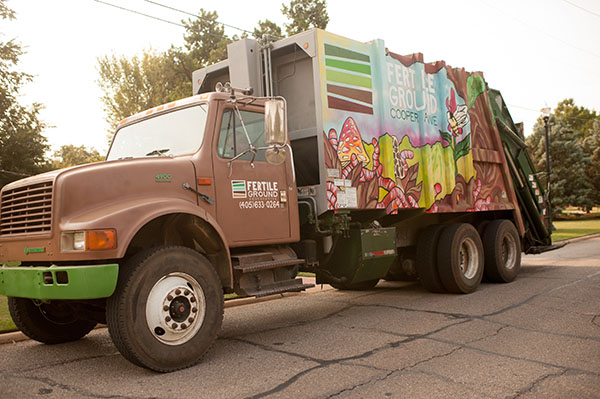
Fertile Ground Cooperative Starts Small Scale Biodiesel Production for Fleet Operations
by Brooke Savoy
Central Oklahoma Clean Cities University Workforce Development Intern
Fertile Ground, a local worker-owned cooperative, provides composting and recycling services to the Oklahoma City Metro area. They began collecting waste vegetable oil in 2017 from local restaurants in anticipation to start producing biodiesel. The cooperative operates two diesel vehicles that collect compost and recycling from residences and businesses but wanted to reduce their emissions and the environmental impact by switching to an alternative fuel.
Biodiesel production began in the June of 2020 when chemist Phillip Ranglin joined the team. Ranglin initially began adopting alternative fuels in his personal vehicle in 2011 by using waste veggie oil he collected. He utilized a two-tank system in his 1981 VW Rabbit that allowed him to drive solely on waste veggie oil. After purchasing a small biodiesel processor which allowed him to start making his own biodiesel, he switched to a 2000 VW Golf and has been producing his own biodiesel for that vehicle since 2014. He was hesitant to start biodiesel production on his own, “but once I looked at a few protocols for making it, I realized that it used some chemistry techniques from high school, and, overall, wasn’t terribly complicated to follow.”
Fertile Ground’s mission is to improve and protect the social and natural environment, so when Terry Craghead – one of Fertile Grounds’ worker owners – met Ranglin at a composting conference in 2018 they decided to come together to work on biodiesel production for the cooperative. Since June 2020, Fertile Ground has produced about 600 gallons of biodiesel.
Not only is biodiesel reducing Fertile Grounds emissions impact, Ranglin stated that biodiesel “cleans the engine because of its detergent properties and maintains this cleanliness of the combustion chambers and fuel system when used continuously.” According to the US Department of Energy Alternative Fuels Data Center, B100 reduces carbon dioxide emissions by 74% compared with petroleum diesel, reduced NOx and VOC’s emissions associated with ground-level ozone pollution and also causes much less damage if spilled or released into the environment.
Fertile Ground also operates a residential bicycle compost pickup further reducing emissions in Central Oklahoma.
About Brooke Savoy
Brooke Savoy is ACOG’s Fall 2020 Clean Cities University Workforce Development Intern. Brooke is a December 2020 graduate of the University of Central Oklahoma with a major in Biology and Sustainability Studies. She has worked at UCO’s Office of Sustainability heading projects such as the annual Local Food Summit and advocating for implementation of renewable energy. With this background she came to understand the importance of reducing human impact on the environment while continuing to serve our communities. Her career goal is to help in the development of sustainable and equitable cities.
